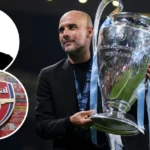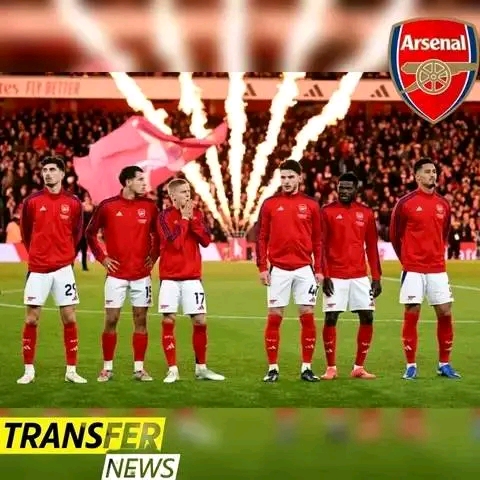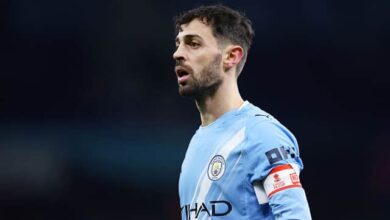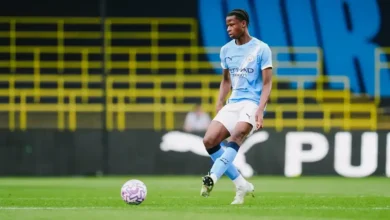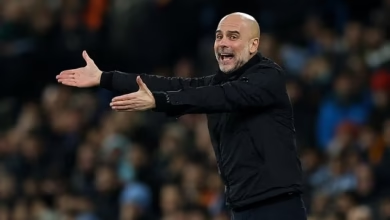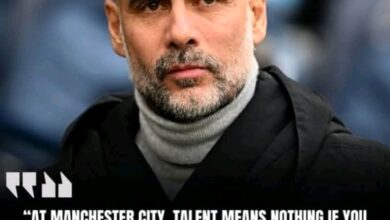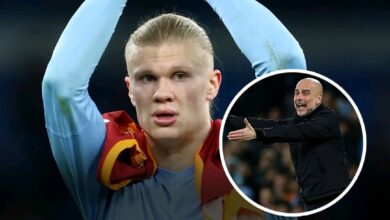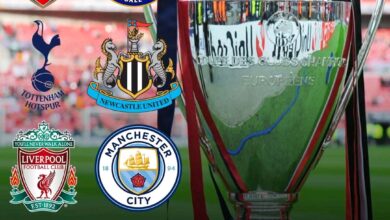The Zinchenko Conundrum: Arsenal’s Uncertain Future with the Ukrainian Sta
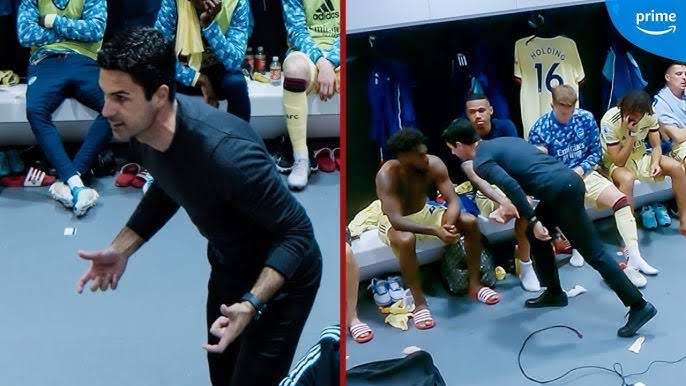
The summer transfer window of 2025 presents Arsenal with a familiar yet complex dilemma that has become increasingly common in modern football: what to do with a talented player whose stock has fallen, whose contract is running down, and whose future at the club appears increasingly uncertain. Oleksandr Zinchenko, the 28-year-old Ukrainian international who arrived at the Emirates Stadium with such promise in 2022, now finds himself at the center of transfer speculation that could see him depart North London for nothing when his contract expires next summer.
According to reports from The Athletic, Arsenal have made the difficult decision to make Zinchenko available for transfer, a move that represents a significant shift in the club’s perception of a player who was once considered integral to their tactical evolution under Mikel Arteta. The situation encapsulates the ruthless nature of modern football economics, where sentiment must often give way to pragmatic decision-making, and where even players with undeniable technical ability can find themselves surplus to requirements when their overall contribution no longer justifies their continued presence
When Zinchenko completed his £30 million move from Manchester City to Arsenal in July 2022, the transfer was met with considerable optimism from supporters and pundits alike. The Ukrainian brought with him a wealth of experience from his time under Pep Guardiola, having been part of multiple Premier League title-winning campaigns and possessing the kind of technical proficiency and tactical intelligence that Arteta valued highly in his systematic approach to team building.
Zinchenko’s early impact at Arsenal was transformative, providing the kind of versatility that allowed Arteta to implement tactical innovations that had previously been impossible with the existing squad. His ability to play both as a left-back and in central midfield gave Arsenal a tactical flexibility that proved crucial during their surprising title challenge in the 2022-23 season. The Ukrainian’s technical ability on the ball, combined with his understanding of positional play developed during his time at City, allowed him to contribute significantly to Arsenal’s build-up play and their ability to progress the ball through different phases of possession.
During his first season, Zinchenko’s influence extended beyond mere tactical contribution. His experience and winning mentality, cultivated through years of success at the highest level, provided Arsenal with a psychological boost that proved invaluable during crucial moments of their campaign. The maturity he brought to a relatively young squad, combined with his vocal leadership and positive influence in the dressing room, made him an integral part of Arsenal’s cultural transformation under Arteta.
However, football is a sport of constant evolution, and what works in one season may prove less effective in the next. As Arsenal’s squad has developed and Arteta’s tactical approach has become more refined, the specific qualities that made Zinchenko so valuable during his initial period at the club have become less essential to their overall game plan. The arrival of new players and the development of existing squad members have created a situation where Zinchenko’s unique skill set, while still valuable, is no longer as indispensable as it once was.
The manager’s increasing tendency to deploy Zinchenko in midfield roles during the latter stages of the 2024-25 season reflected both his versatility and the club’s changing tactical needs. However, it also highlighted a fundamental issue: Arsenal have become increasingly well-stocked in both defensive and midfield positions, creating a competitive environment where Zinchenko’s opportunities for regular first-team football have become limited. The emergence of younger players and the acquisition of new talent have created a squad depth that, while beneficial from a competitive standpoint, has made it challenging for certain players to maintain their previous levels of involvement.
This tactical evolution has been accompanied by a shift in Arsenal’s defensive requirements. The high-intensity, high-pressing style that Arteta has implemented demands certain physical and defensive attributes that have exposed some of Zinchenko’s limitations. While his technical ability and game intelligence remain unquestioned, his defensive frailties have become increasingly apparent, particularly when facing teams that specifically target his side of the pitch with diagonal switches and rapid counter-attacks.
One of the most significant factors contributing to Zinchenko’s diminished role at Arsenal has been his defensive inconsistencies. Despite his tactical intelligence and technical proficiency, the Ukrainian has struggled to adapt to the physical and pace demands of Premier League defending, particularly when deployed as a traditional left-back. Opposition teams have increasingly identified his position as a potential weakness, regularly targeting his side with diagonal switches of play and quick counter-attacking moves designed to exploit his defensive limitations.
These defensive frailties have become more pronounced as Arsenal have faced increasingly sophisticated tactical approaches from their opponents. Teams have studied Arsenal’s playing patterns and identified that Zinchenko’s advanced positioning and technical focus can leave space behind him that can be exploited by pacey wingers and overlapping full-backs. The frequency with which these tactical plans have succeeded has forced Arteta to reconsider Zinchenko’s role within the team structure, leading to reduced playing time and questions about his long-term suitability for the position.
The defensive concerns extend beyond individual duels and positioning errors. In Arsenal’s high-pressing system, full-backs are required to provide both offensive support and defensive solidity, often needing to recover quickly from advanced positions to deal with counter-attacks. Zinchenko’s physical limitations and tendency to be caught out of position during these transitions have created vulnerabilities that opponents have been quick to exploit, leading to defensive instability that has affected the team’s overall performance
Despite his on-field struggles, Zinchenko’s influence within the Arsenal dressing room remains significant and largely positive. Recent testimonials from teammates Gabriel Martinelli and Jorginho, who identified him as the funniest player at the club and predicted he would make an excellent pundit after his playing career, highlight the Ukrainian’s importance to team morale and squad dynamics. This aspect of his contribution to Arsenal cannot be understated, particularly in a sport where psychological factors and team chemistry play crucial roles in determining success.
Declan Rice’s previous description of Zinchenko as ‘the biggest character’ in the Arsenal dressing room speaks to his leadership qualities and his ability to influence his teammates in positive ways. His experience of winning major trophies, combined with his naturally outgoing personality and professional approach, has made him a valuable mentor figure for younger players and a source of stability duing challenging periods.
The testimonials from his teammates also suggest that Zinchenko possesses qualities that extend beyond football, including intelligence, humor, and communication skills that could serve him well in post-playing career opportunities. The prediction that he would excel as a pundit reflects not only his understanding of the game but also his ability to articulate complex tactical concepts and provide insightful analysis of football situations.
Zinchenko’s statistical profile during his time at Arsenal provides insight into both his contributions and his limitations. Having played 91 games since joining the club, accumulating three goals and five assists, his offensive output has been modest but consistent with his role as a defensively-minded full-back who occasionally contributes to attacking phases of play. However, these numbers tell only part of the story of his Arsenal career.
The reduction in his playing time during the 2024-25 season, with only 23 appearances across all competitions, reflects the changing dynamics within the squad and the increased competition for places. This decrease in involvement coincides with Arsenal’s improved squad depth and tactical evolution, suggesting that his reduced role is not necessarily due to a decline in his individual abilities but rather a result of changing team requirements and increased competition.
When analyzing his defensive statistics, patterns emerge that support concerns about his defensive reliability. Metrics related to duels won, successful tackles, and defensive actions completed paint a picture of a player who, while technically proficient, struggles with the physical and pace aspects of Premier League defending. These statistical trends have likely influenced Arsenal’s decision-making regarding his future at the club.
The financial aspect of Zinchenko’s situation presents Arsenal with a complex challenge that extends beyond pure football considerations. Having invested £30 million in his acquisition from Manchester City, the club now faces the prospect of recouping only a fraction of that investment, if anything at all. With less than 12 months remaining on his current contract, Zinchenko’s transfer value has been significantly diminished, creating a situation where potential suitors may prefer to wait until his contract expires to acquire his services for free
This scenario reflects broader trends in modern football economics, where player contracts and timing have become crucial factors in determining transfer values. The reluctance of potential buyers to pay significant fees for players in the final year of their contracts has created a market dynamic that often disadvantages selling clubs, particularly when the player in question has seen his stock decline due to reduced playing time or performance issues.
Arsenal’s willingness to accept offers significantly below Zinchenko’s original transfer fee demonstrates the pragmatic approach that modern football clubs must adopt when dealing with depreciating assets. The club’s primary concern is likely to avoid losing the player for nothing while potentially using any transfer fee received to fund other acquisitions that better suit their current tactical requirements and long-term planning
The timing of Arsenal’s decision to make Zinchenko available coincides with a transfer market that has become increasingly complex and financially constrained. Many clubs are operating under tight budget restrictions, making them reluctant to pay premium prices for players who may be available for free in the near future. This market dynamic has created a challenging environment for selling clubs like Arsenal, who must balance their desire to recoup investment with the reality of current market conditions.
The specific circumstances surrounding Zinchenko’s contract situation make him an attractive proposition for clubs willing to wait until summer 2026. His experience, technical ability, and proven track record at the highest level would make him a valuable free agent acquisition, providing significant cost savings compared to purchasing similar quality players in the current market. This reality has likely influenced Arsenal’s decision-making, as they recognize that finding buyers willing to pay reasonable fees for a player available for free in twelve months may prove challenging.
Furthermore, Arsenal’s own transfer ambitions for the current window may necessitate player sales to fund new acquisitions. The club’s pursuit of high-profile signings often requires careful financial planning and may depend on generating funds through player departures. In this context, any fee received for Zinchenko, regardless of how it compares to his original cost, could prove valuable in facilitating other transfer business
Arsenal’s decision to make Zinchenko available for transfer reflects broader squad planning considerations that extend beyond the Ukrainian’s individual situation. The club’s investment in alternative options for the left-back position, combined with their midfield depth, has created a situation where Zinchenko’s specific skill set is no longer essential to their tactical approach. This redundancy, while positive from a squad depth perspective, has made his continued presence at the club less justifiable from both financial and playing time perspectives.
The emergence of alternative tactical solutions has also reduced Zinchenko’s importance to Arsenal’s game plan. Arteta’s tactical evolution has incorporated different approaches to build-up play and positional rotation that do not necessarily require Zinchenko’s specific combination of technical ability and positional flexibility. Younger players within the squad have developed the skills necessary to fulfill similar roles, while new signings have provided alternative tactical options that better suit the team’s current requirements. This shift in ta

